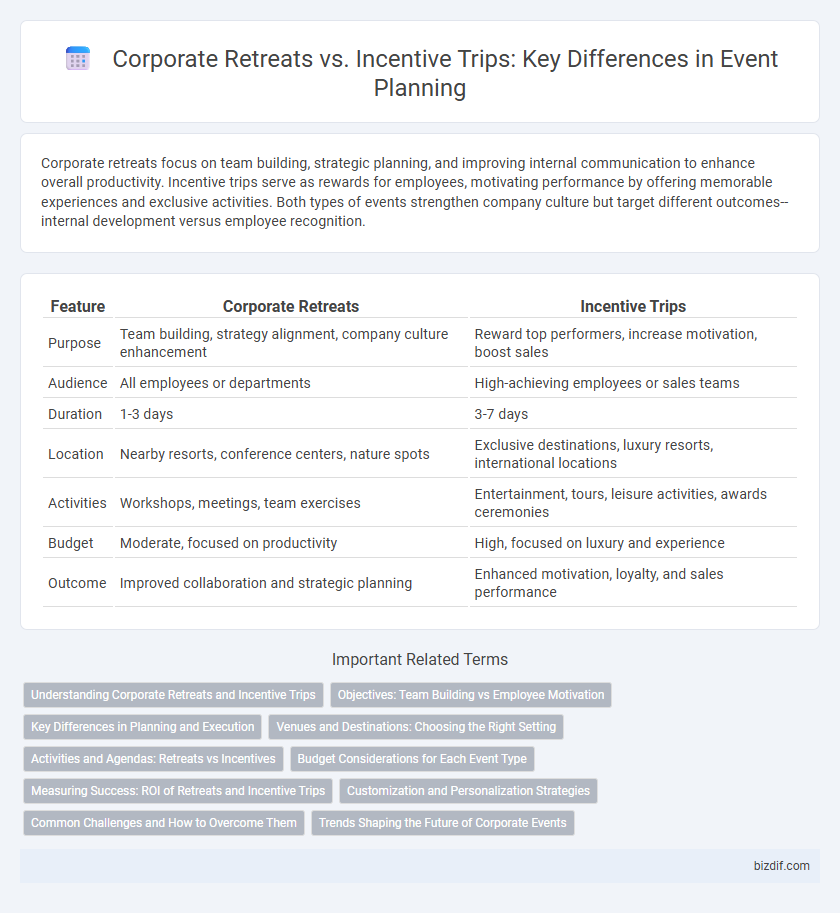Corporate retreats focus on team building, strategic planning, and improving internal communication to enhance overall productivity. Incentive trips serve as rewards for employees, motivating performance by offering memorable experiences and exclusive activities. Both types of events strengthen company culture but target different outcomes--internal development versus employee recognition.
Table of Comparison
| Feature | Corporate Retreats | Incentive Trips |
|---|---|---|
| Purpose | Team building, strategy alignment, company culture enhancement | Reward top performers, increase motivation, boost sales |
| Audience | All employees or departments | High-achieving employees or sales teams |
| Duration | 1-3 days | 3-7 days |
| Location | Nearby resorts, conference centers, nature spots | Exclusive destinations, luxury resorts, international locations |
| Activities | Workshops, meetings, team exercises | Entertainment, tours, leisure activities, awards ceremonies |
| Budget | Moderate, focused on productivity | High, focused on luxury and experience |
| Outcome | Improved collaboration and strategic planning | Enhanced motivation, loyalty, and sales performance |
Understanding Corporate Retreats and Incentive Trips
Corporate retreats focus on team building, strategic planning, and fostering collaboration within a company, often taking place in a relaxed environment to enhance employee productivity and morale. Incentive trips serve as rewards for achieving specific business goals or performance milestones, emphasizing luxury experiences and motivation to boost employee engagement and retention. Understanding these differences helps planners tailor event objectives, budgets, and activities to maximize organizational benefits.
Objectives: Team Building vs Employee Motivation
Corporate retreats primarily focus on team building by fostering collaboration, communication, and problem-solving skills among employees through structured activities and workshops. Incentive trips center around employee motivation, rewarding high performers with exclusive experiences that boost morale and encourage productivity. Both event types aim to enhance workplace dynamics but address different organizational goals through tailored objectives.
Key Differences in Planning and Execution
Corporate retreats focus on team building, strategic planning, and internal communication, requiring venues with conference facilities and spaces for workshops. Incentive trips prioritize reward and recognition, emphasizing luxury accommodations, entertainment, and exclusive experiences to motivate employees. Planning corporate retreats involves detailed agenda setting and leadership participation, while incentive trips demand personalized itineraries and seamless logistics to enhance employee satisfaction.
Venues and Destinations: Choosing the Right Setting
Corporate retreats often require venues that promote team building and strategic discussions, such as secluded resorts or conference centers with ample meeting spaces. Incentive trips typically prioritize luxurious, exotic destinations that offer unique experiences to motivate and reward employees. Selecting the right setting involves aligning the venue's atmosphere and amenities with the event's goals, whether fostering collaboration or celebrating achievements.
Activities and Agendas: Retreats vs Incentives
Corporate retreats focus on team-building activities, strategic planning sessions, and workshops designed to enhance collaboration and company culture. Incentive trips emphasize rewards, entertainment, and exclusive experiences tailored to motivate high performers and celebrate achievements. Agendas for retreats tend to be structured around long-term goals, while incentive trips prioritize engaging, memorable activities to boost employee morale.
Budget Considerations for Each Event Type
Corporate retreats often require a fixed budget that covers venue rental, team-building activities, and professional development sessions, with costs varying based on location and group size. Incentive trips generally allocate a higher budget per participant, focusing on luxury accommodations, exclusive experiences, and travel expenses to motivate and reward top performers. Understanding these budget distinctions helps organizations allocate resources effectively while aligning expenditures with event objectives.
Measuring Success: ROI of Retreats and Incentive Trips
Measuring the ROI of corporate retreats and incentive trips involves evaluating employee engagement, productivity improvements, and overall financial performance post-event. Corporate retreats often focus on team-building and strategic alignment, which can be quantified through surveys and performance metrics, while incentive trips drive motivation and sales increases, measurable through revenue growth and retention rates. Accurate ROI assessment requires tracking key performance indicators specific to the event's objectives and analyzing long-term business impact.
Customization and Personalization Strategies
Corporate retreats emphasize customizable team-building activities and personalized agendas tailored to company culture and objectives, enhancing employee engagement and collaboration. Incentive trips focus on luxury experiences and individualized rewards designed to motivate high performers, using data-driven personalization to align with participants' preferences and performance metrics. Both event types leverage advanced customization strategies to maximize impact and return on investment through targeted content and bespoke experiences.
Common Challenges and How to Overcome Them
Corporate retreats and incentive trips often face challenges such as budget constraints, balancing work and leisure activities, and ensuring engaged participation from all attendees. Overcoming these obstacles requires clear goal-setting aligned with company objectives, selecting venues that offer both professional spaces and relaxation opportunities, and incorporating team-building exercises tailored to diverse employee interests. Leveraging specialized event planning software can streamline logistics, improve communication, and enhance overall attendee experience for successful corporate events.
Trends Shaping the Future of Corporate Events
Corporate retreats emphasize team-building and strategic planning, incorporating immersive wellness programs and hybrid formats to enhance employee engagement. Incentive trips prioritize rewarding high performance, with a growing trend towards personalized experiences and sustainable travel options. Both event types increasingly leverage AI-driven analytics and virtual reality to deliver impactful, data-driven outcomes for corporate goals.
Corporate retreats vs incentive trips Infographic

 bizdif.com
bizdif.com